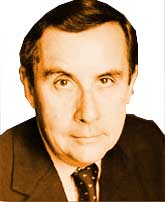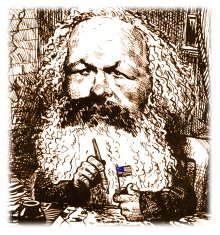|
|

Jewish World Review / May 21, 1998 / 25 Iyar, 5758
William Pfaff
PARIS -- Marx and Engels' Communist Manifesto, which is
150 years old this year, did not change the world for which it
was written. The manifesto proved nonsense as forecast of
the workings of a supposed dialectic of history, and it was
disastrous in its political consequences. It produced the
utopian totalitarianism of Lenin and Stalin, with systematic
and destructive attack upon every rival conception of reform.
The leaders inspired by Marx and Engels understood that
while it was profitable to them to preach anti-capitalism,
anti-imperialism and anti-fascism, the real threat to them
came from the social democratic, Christian democratic and
liberal reform movements of 19th- and 20th-century Europe
and America.
However, the ideological identity that Marx and Engels had
given to communism, as the sole historical alternative to
capitalism, meant that the capitalists themselves came to
believe this, and when the Communist movement failed, 80
years after it had come to power in Russia, this seemed an
unqualified validation of capitalism.
On the other hand, virtually everyone today would
acknowledge that Marx and Engels were prophetic analysts of
capitalism. Their account of a restless, innovative,
internationalist industrial system, constantly destroying and
recreating itself, is actually a better description of today's
globalized free-market capitalism than of the capitalism of
1848, when they wrote.
Their description of a conscienceless and predatory system
finds echo among globalism's critics today, even those who
believe, with Margaret Thatcher, that there is no alternative
to the system which now prevails among the industrialized
nations and in a large part of the non-Western world.
Many concerned for the social and human devastation that
globalization can produce, and its indifference or hostility to
ethical and social considerations, have nonetheless concluded
that the technological, economic and political forces behind it
are irresistible.
Most voters in the industrial nations undoubtedly take for
granted the system in which they live. The winners rejoice in
its opportunities. The losers may resent their loss of security,
and the market's destruction of familiar social structures and
values, but find it hard to think that anything can be done to
change what is happening.
A consequence of Marxism's collapse has been that it has
seemed to rule out critiques of modern capitalism as
irrelevant and make proposals to reform it seem futile or
utopian. A basic division of opinion exists today between
those who think that a choice of society does still exist, and
those who believe that no choices remain: that in the famous
formulation of Francis Fukayama (and in a sense he did not
intend, but which was implicit in what he wrote), history has
ended.
This division exists inside countries, but also divides certain
nations from others, notably in setting what can be called the
Atlantic countries -- the United States, United Kingdom, the
Netherlands and certain others -- from those where voters are
prepared to believe that contemporary capitalism can or
should be changed, or at least that it can be reconciled with
the model of social capitalism, or welfare capitalism, which
emerged in Western Europe and Scandinavia after World
War II.
The Germans and French are leaders of the latter group. The
next German national election, in September, will turn in part
on social and welfare issues. In France these issues were
responsible for a devastating and unexpected defeat of the
conservative government in parliamentary elections a year
ago.
The French Communism newspaper L'Humanite recently
commissioned a national poll in France on attitudes toward
capitalism. Asked whether they felt enthusiasm about
capitalism, or hope, indifference, fear or rebellion, 22 percent
said enthusiasm or hope, and 53 percent said fear or
rebellion. This was a cross-section of the entire population.
The 10 values that the French respondents to this poll
associated with capitalism were, in order of importance,
technological innovation, egoism, competitivity, creation of
riches, unequal opportunity, progress, social exclusion,
freedom of expression, devaluation of work and insecurity.
But people believe that the system can be changed. Ninety
percent of those polled in France said they wanted change:
13 percent radical change, 33 percent ``change in depth,'' 44
percent improvements in the system. Only 5 percent were
content with the economic system as it is.
A belief in the possibility of change characterizes the German
Social Democrats (and Greens), who are now considered
likely to win power in September. The Socialist-led
government in France is committed to reconciling the social
commitments already made in France with economic reform.
It is, of course, one thing to want change and another thing to
succeed with it. The interesting thing is that the two countries
which will dominate ``Euroland'' -- the new European
monetary bloc that comes into existence next January -- resist
the free-market consensus on the irreconcilability of a
successful economy with a welfare state. That is as significant
a fact as the emergence of European monetary union
 The Communist mainfesto, at 150, prophesied the
shape of today's capitalism
The Communist mainfesto, at 150, prophesied the
shape of today's capitalism

5/19/98: Globalized capitalism is more significant than
nuclear weapons
5/13/98:
Negotiating in reality, not
wishfulness
5/7/98:
Things can only get better
and better!
5/5/98:
Racial, ethnic, national barriers disappearing
5/5/98:
Racial, ethnic, national barriers disappearing
4/21/98: A terrifying synthesis of forces spawned Pol Pot's regime
4/19/98: Russian-German-French structure of consultation is good development
4/16/98: Violence in society comes from the top as well as the bottom
4/13/98: Clinton's foreign policy does have a sunny side, too
4/8/98: Public interest must control marketplace
4/5/98: Great crimes don't require great villians
3/29/98: Authority rests on a moral position, and requires consent
3/29/98:Signs of hope in troubled Russia
3/25/98: National Front amassing power
3/23/98: NATO's expansion contradicts other American policies
3/18/98: The New Yorker sought money, but lost it
3/16/98: America's 'strategy of tension' in Italy
3/13/98: Slobodan Milosevic may have started something that can't be stopped